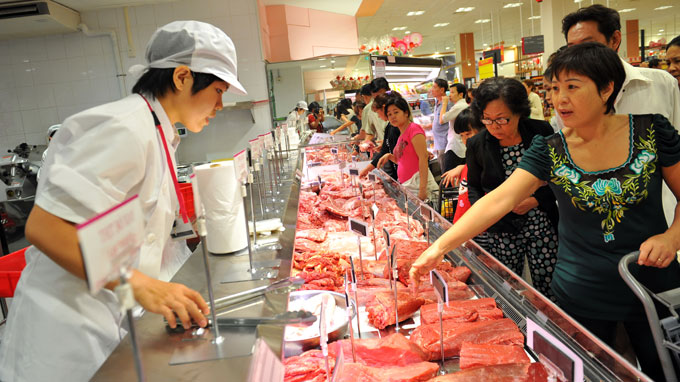The opening of new shopping center in District 1, Ho Chi Minh City in 2015 will turn the area into a bustling shopping district like what people see in Bangkok and Singapore, according to Vietnam’s Retail Market Update report recently released by realty consultancy firm CBRE Vietnam.
>> An audio version of the story is available here
“With the completion of The One, the second phase of Saigon Centre and the Tax Plaza in District 1, HCMC shoppers can anticipate a shopping district on a par with Sukhumvit Road in Bangkok or the famous Orchard Road in Singapore,” said Richard Leech, executive director of CBRE Vietnam, in the report.
Spending should improve in 2015 given lower oil prices, lower interest rates, and positive effects that a stable economy was having on consumer confidence, said the report reviewing the past 12 months and forecast trends for 2015.
Lower oil prices results in lower transportation costs, so the costs of goods sold should be lower. Retail sales and services of Vietnam at the end of 2014 grew to about US$140 billion, according to the General Statistics Office of Vietnam.
However, growth had slowed significantly over the last few years, according to the report.
Ample supply
Supply of retail space has grown in both the major markets of Hanoi and HCMC and will continue to grow during 2015.
By the end of the year, it is expected that Hanoi will have about 900,000 square meters of formal retail space and HCMC 600,000 square meters.
In terms of the number of projects and square meters in the pipeline Hanoi and HCMC stack up well against its regional neighbors with Hanoi in 7th position, most other cities ahead of Hanoi are in China.
HCMC is expecting at least 5 new projects in 2015, two of which are being developed by SSG, a megamall project by Vingroup and the eagerly awaited Vivo City due to open in District 7 in April 2015. Apart from having more supply of formal retail space than HCMC, Hanoi has softer rents and higher vacancies.
HCMC rental fees have remained stable at approximately US$100 per square meter in the Central Business District (CBD) and around US$40 per square meter in the non-CBD locations.
HCMC vacancies are less than 8 percent compared to Hanoi of more than 20 percent. New supply that came on line in 2014 was dominated by Korean retailer Lotte in the North and by Japanese retailer Aeon in the South.
Both these foreign retail giants opened multiple locations in Vietnam in 2014 and will continue to expand into 2015. The first metro line of HCMC, which is currently under construction, will link together several shopping centres in the HCMC CBD and District 2.
‘Affordability’ to take lead
Apart from the aggressive expansion plans for foreign and local retailers in Vietnam in 2015, one of the most noticeable trends is ‘affordability’.
The emergence of new bazaars, containing hundreds of small kiosks, rent-free shopping malls such as Hoa Binh Green City, and low-priced supermarkets are all reinforcing the trend that consumers demand better value for money. Food and beverage (F&B ) outlets have been the stand-out sector during 2014 and will continue to dominate the high streets.
“The F&B sector is leading the charge in terms of occupying ‘unconventional’ retail space, and grouping together in specific nodes such as West Lake in Hanoi and Crescent Lake in HCMC” said Leech in the report. “Competition for a share of the consumer’s wallet is fierce. Consumers are now more sophisticated and knowledgeable and place value on an overall retail experience when shopping,” Leech added.
“Shopping centers’ managers will need to have a good understanding of what their customers want, leverage the data they can collect from digital applications and marketing, provide more and better quality entertainment facilities and collaborate more with retailers,” he said.




















































